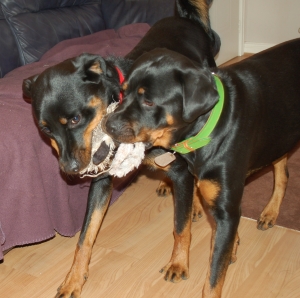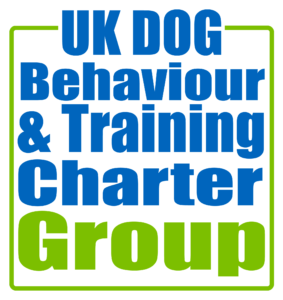We love to see our dogs playing with others, and good play can help enrich dogs’ lives. However, what might be ‘play’ for one dog, might be frightening or even painful for another.
Unrestricted play, especially amongst juvenile or adolescent dogs can actually teach them some unwanted habits that might lead to some serious behaviour problems later on in life. This is just as true of multi-dog households as well as any third party who might be looking after your dog for you.

What are some of the risks of unrestricted free play?
- Misunderstood ‘conversations’
A lack of understanding of canine body language may mean that their ‘conversations’ are being misinterpreted by the human supervisor. We can sometimes misunderstand dog body language and assume all parties are happy with the ‘game’ when maybe one dog may not be enjoying it quite so much. Did you know that ‘bows’ are not always an invitation to play? They are just as likely to be a ‘go away’ signal, or an ‘I want to chase you’ signal (and not in a nice way!). - The daily addiction of rude play
Dogs learn from the role models around them. ‘House mates’ from multi-dog households that like to play rough and tumble with each other, are noisy when playing and perhaps like to use their feet to ‘splat’ the other may unintentionally intimidate a strange dog that doesn’t enjoy that style of play. Many cases of dog-dog aggression/frustration can stem from repeated negative experiences with unknown dogs, which can often start with a misguided attempt to ‘play’ that gets re-buffed by hostile behaviour from the ‘victim’. - On-lead reactivity
Many dogs (especially adolescents) that enjoy too much unrestricted play with others can become very frustrated while they are on lead and are not allowed to meet other dogs. Dogs need to learn polite, calm behaviour introductions to strange dogs, as well as how to play nicely. - Poor recall
Some dogs can literally become obsessed with playing with others, and start to ignore their owners in the park if they see a likely ‘friend’ in the distance. These dogs can quickly become a public nuisance – not all dogs like to play with dogs they don’t know, they might be elderly or recovering from illness or injury. Dogs don’t understand what other dogs being on lead means (unless they have been specifically taught to), and a dog rushing up into the face of a strange dog is asking for trouble. - Social embarrassment!
No-one wants to be the owner of the out of control, semi-feral dog that’s interfering with everyone else trying to enjoy a peaceful walk with their pooch – right?
Here are some simple guidelines for ensuring that your dog is happy, well-adjusted and playing appropriately with others.
- Ask before you allow your dog to approach an unknown dog. There are many reasons why some dogs are not suitable play mates for your dog, and it’s just polite to ask first. Treat dogs on lead with respect, and never allow your dog to approach another wearing a muzzle without checking with the owner first.
- Canine body language is complex, often very subtle and needs a good understanding to be able to supervise dog to dog play appropriately. We can sometimes misunderstand dog body language and assume all parties are happy with the ‘game’ when maybe one dog may not be enjoying it quite so much. It’s a truly fascinating subject, and well worth learning more from a reputable source.
- Play should always be ‘concentual’ – that means BOTH parties need to be genuinely enjoying the game. Some dogs like to play rough and wrestle, some like ‘chase me’ games. Some don’t, and might enjoy sharing a toy instead – some might be very possessive over a toy! It’s really important that personalities are appropriately matched before allowing free play.
- Rough play can escalate quite quickly to fisticuffs – play sessions that are short and sweet are less likely to ‘explode’. Mix up play session with ‘calm’ behaviours to help teach your dog an ‘off-switch’.
- Injuries should not occur during play, especially puncture wounds from teeth. Dogs generally have excellent spatial awareness and can choose to inhibit their bite (or not). There are no such things as accidental bites – if your dog has punctured another during ‘play’ then you may need some professional assistance to help your dog learn better play manners.
A good behaviourist or dog trainer will be able to help you understand what’s really being said during canine conversations. Good places to look for advice are www.apdt.co.uk, www.apbc.org.uk, www.abtcouncil.org.uk.
At Abbey Dog Training we can help you read your dog’s play behaviour, and help you understand if there are any ‘messages’ you should discourage, to ensure you don’t face problems in the future.
Email us if you would like to know more.






At last! An article that lays out why it is vital to be aware of exactly what your dog is actually doing when in other people’s care. I particularly recognise the reference to rude play and addiction to play if dogs are left unsupervised or regularly have off lead free for alls in groups when walking.